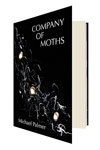For just over three decades, the Language poet Michael Palmer has been among America’s most elegant—and abstract—heirs to modernist poetry. His abstraction is not always well received. Just two years ago in Harper’s, Daniel Anderson caustically named Palmer among the poets undeserving of inclusion in Norton’s most recent Anthology of Modern and Contemporary Poetry. Yet, if anything, Palmer’s Company of Moths will act as an indicator that it is we readers of poetry who have diminished. Underappreciated as a verse stylist, the Californian has hewn a voice for the philosopher-poet in contemporary American verse by bringing thoughtfulness and skepticism to bear on the quotidian, and doing so in surprisingly emotional registers. In this role, Palmer inherits much from a tradition that extends from antiquity to modernity and to the heirs of the modernists. Indeed, Palmer nods directly to the later modernist Louis Zukofsky in the section “Scale,” perhaps the highlight of this volume.
Ironically, it is not in “Scale” but the other sections of the volume (“Stone,” “Company of Moths,” and “Dream”) that Palmer’s debt to Zukofsky is clearest. In these sections, Palmer’s voice is grave; the writing is persuasive, and has a new readiness for extravagance (“Cupido, there are madeleines hanging in sacks, there’s lava in Ghana,/ each day new elephants on parade”). Yet Palmer is also self-consciously hesitant with the authority natural to a reigning sire of the avant-garde. The opening stanza of “And” enunciates this skilled ambivalence: “The ship what was her name, its name?/ Was it The Moth? Or The Moth/ That Electrifies Night? Or The Moth// that Divides the Night in Half/ In its Passage toward the Fire?”
Palmer’s lines are dramatic, and part of the drama is their elliptical manner: the name changes are deliberate, not corrections of remembering. This naming and renaming is a mimicry of amnesia. But why act the amnesiac role? In this case, the poem is dedicated “to the memory of a suicide.” In the light shone from the dedication, the lines become a tortured rendering of how certain deaths are remembered. Palmer’s abstraction is in illustration of very private experience, not a wordsmith tinkering at several removes from experience.
The experiential grounds underscoring Palmer’s lyrics sets him apart from other Language poets, excepting perhaps Lyn Hejinian. In his newest volume, Palmer’s concern with these experiential grounds becomes skillfully rendered in sensory images. The lyric “Este Mundo” is a meditation on isolation and translation. “And the idol asleep in the mountain,/ his nurse’s milk on his lips.// He’s dreaming of peacocks,/ meteors, pyromaniac moths,// dreaming of serpents and pyramids,/ worlds hanging from clouds,// the wine jug, the lover’s spine,// and fire as it claims/ the edges of a page.// Bastante?”
This image—and others in the volume—may baffle the reader. Yet the vibrant hints of emotion that set Palmer apart are clear. Images of tyranny, eros, and knowledge combine, and we will respond to the poet’s eloquence before we can make sense of the verse. Yet this faltering approach to coherence, this recession of what Palmer calls “an arc or enlacement/ that can’t be shown” is not a blocking agent. What can be named can be named again, and for Michael Palmer the company of moths is shared between acts of naming.





